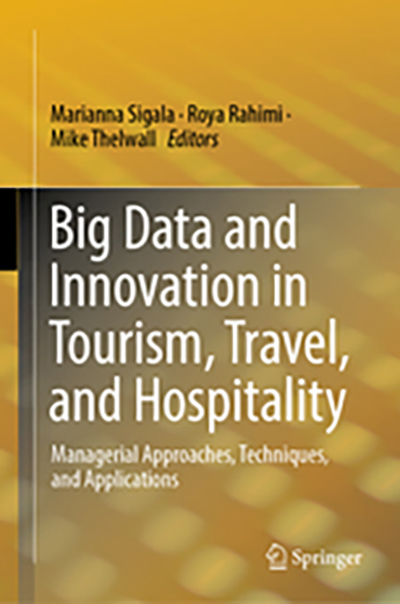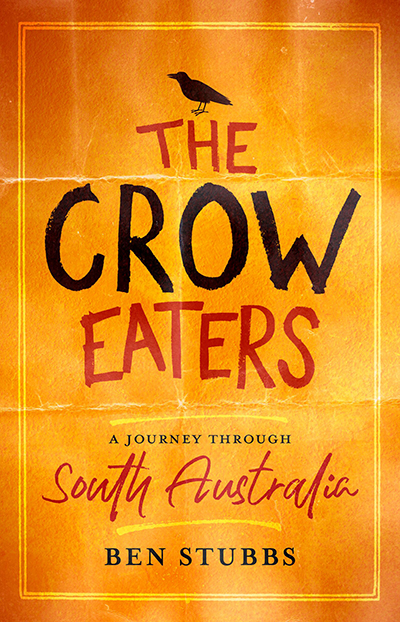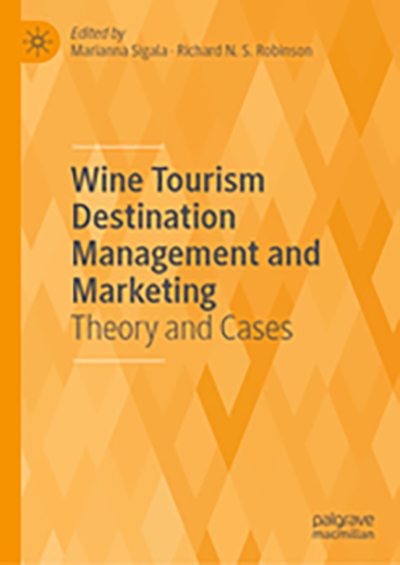The latest books from UniSA researchers
- Big Data and Innovation in Tourism, Travel, and Hospitality
- Regulating Water Security in Unconventional Oil and Gas
- The Crow Eaters: A Journey Through South Australia
- Wine Tourism Destination Management and Marketing
Big Data and Innovation in Tourism, Travel, and Hospitality

Big Data and Innovation in Tourism, Travel, and Hospitality combines multi-disciplinary research and practical evidence about the role and exploitation of big data in driving and supporting competitiveness and innovation in tourism.
Nowadays, companies have more access to big data than they know how to manage and translate into value.
The book provides a consolidated framework and roadmap summarising the major issues that both researchers and practitioners have to address to be able to manage and use big data as a valuable organisational asset.
The book, co-edited by UniSA’s Professor Marianna Sigala, proposes a process-based model to identify and implement big data driven innovation strategies in tourism.
In one chapter, Prof Sigala and co-authors including Professor Andrew Beer and Associate Professor Allan O'Connor, discuss how to use big data for enriching decision-making related to (tourism) economic development projects. For example, economic development agencies can use big data (such as, tourists’ reviews on destinations, Uber mobility patterns of citizens) in order to identify appropriate development projects (e.g. road infrastructure, operating hours of stores, public services to improve quality of destinations/events). To use big data, the chapter provides a framework for identifying and evaluating big data sources and implementing big data initiatives, based on four criteria.
Big data revolutionises the way organisations measure their performance and subsequently how they work. This book will help organisations to access more data which can be better handled and translated into greater value.
Chapters also examine appropriate methodologies for analysing big data as well as for balancing the trade-offs including the costs and limitations as well as the benefits of big data
Being the oil of the digital economy, this book enables readers to gain valuable insights into how to extract business value from big data. By contextualising big data strategies in tourism, travel and hospitality, the book is particularly valuable to professionals working in these industries.
Big Data and Innovation in Tourism, Travel, and Hospitality is available online from Springer.
Regulating Water Security in Unconventional Oil and Gas

Hydraulic fracturing is the process in which rocks are fractured by a pressurised fluid, allowing pathways for oil, gas and water to flow through. The method has raised much debate recently; its proponents emphasise the economic benefits of accessing new sources of oil and gas. However, risks include water contamination, air and noise pollution and triggering earthquakes. A new book, Regulating Water Security in Unconventional Oil and Gas, examines the impacts of hydraulic fracturing on the water environment and the regulations surrounding water use for oil and gas production.
Co-edited by UniSA Professor of Business Law Jennifer McKay, the book addresses the need for a deeper global understanding of government policy around water use for shale oil and gas production. Prof McKay, who has an extensive background in environmental management including 16 years as a Commissioner of the SA Environment, Resources and Development Court, and her co-editors, compare different approaches to these issues from around the globe, providing insights into how policy, best practices and regulation may be developed to advance the interests of all stakeholders.
The book takes an interdisciplinary approach including chapters looking at the relationship between water and energy security, along with issue-focused case studies written by scholars from around the world. Chapter topics, organised in line with the stage of the gas production process upon which they touch, include the implications of hydraulic fracturing for agriculture, communities and other stakeholders competing for water supplies; public opinion about the use of water for hydraulic fracturing; potential conflicts between hydraulic fracturing and water as a human right; the disposal or recycling of produced water as well as discussing its potential to trigger earthquakes. Several chapters also discuss the implications for indigenous communities, including sustainable water management.
This book will be of particular interest to scholars and students of energy and water, regulators, policymakers and operators concerned in ensuring that they align with emergent best global practice.
Published by Springer, Regulating Water Security in Unconventional Oil and Gas is available online from 18 August.
The Crow Eaters: A Journey Through South Australia

The Festival State, the Wine State, the Crow Eaters – whatever the name, outsiders see South Australia as different, often without knowing much about it. Coupling his own travel across the million-square kilometres of the State with an investigation of its history, Dr Ben Stubbs looks to expose what South Australia is really like in his new book, The Crow Eaters: A Journey Through South Australia.
With a background as a travel and features journalist for notable publications in Australia and overseas, Dr Stubbs explores places of quiet beauty and meets some memorable people along the way – in the spirit of the best travel writing and literary non-fiction. En route he debunks many of the clichés that plague the State. Travelling to Maralinga, Ceduna, Kangaroo Island, the Flinders Ranges, Coober Pedy, and the once-mighty river that is the Murray, the book shines a light on South Australia’s rich and varied cultural history. He even tackles head-on the question: “Is South Australia weird?”
Dr Stubbs’ immersive look at the stories and people of South Australia brings this diverse State to life. Readers may find it difficult to resist the book’s implicit invitation to explore places much closer to home; to take the time to soak up the dramatic landscapes that are slow, deep and speckled with unforgettable characters.
Published by NewSouth Books, The Crow Eaters: A Journey Through South Australia is available now in bookstores.
Wine Tourism Destination Management and Marketing

Wine Tourism Destination Management and Marketing – Theory and Cases provides a holistic approach to wine destination management and marketing by bringing together wine tourism research with research in wine and destination management.
The chapters have been contributed by numerous international authors offering an international and multidisciplinary perspective.
Co-editor Professor Marianna Sigala has written several chapters, including one detailing the co-opetition business model (co-operating with competitors) of the ultimate winery experience in Australia. By referring to the case of the Mount Lofty Ranges Agrarian Landscape, she also explores how to develop and brand a wine destination through UNESCO World Heritage listing. The book also features the iconic cellar door of d‘Arenberg (The Cube) and uses it as one of the many examples to better illustrate how to develop and market wine destinations through art.
In another chapter, Prof Sigala examines the value of the hop-off hop-on bus in supporting tourists to move around a wine region and so, disperse and generate multiplier economic impacts for a greater number and geography of economic actors.
The book combines fresh research approaches with international industry examples and case studies in the following key topics: understanding demand for wine destinations; new approaches and practices of wine destination marketing; innovation and design of wine destination experiences and wine routes; and planning and development of wine destinations.
The book analyses wine destination management and marketing issues from the perspectives of the various stakeholders, including tourists, cellar doors, wine tourism firms, destination managers, wine associations and networks.
Wine Tourism Destination Management and Marketing – Theory and Cases is a valuable read for researchers and industry professionals. The book is published by Springer and is available online.
Other Stories
- A midnight snack might be the key to working overnight
- Memory warning to those wanting to spice up their lives
- Study indicates causal link between obesity and multiple diseases
- Dragonflies are helping make driverless cars safer
- From the Vice Chancellor
- Achievements and Announcements
- Sixteen images that will change how you view research
- Technology preventing hospital falls explained through animation
- Refurbished spaces for Aboriginal students open at City East and Magill
- Healthy lifestyle may counteract genetic risk of dementia
- Video: See highlights from the first six months of 2019
- UniSA visual artist represented on world stage at Cairo Biennale
- Students and staff to provide a ‘hand up’ to help the homeless
- The latest books from UniSA researchers
- UniNationals and Crows lunch




